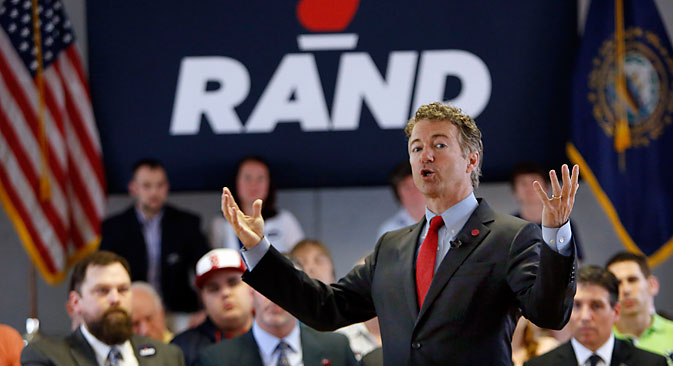
Republican Senator Rand Paul. Source: AP
The vote in the U.S. Senate to extend the Patriot Act, which grants security services sweeping powers to spy on citizens in order to prevent terrorist attacks, has unexpectedly ended in failure, the business daily Kommersant reports.
An outspoken opponent of the law, Republican Senator Rand Paul, used procedural tools to block the extension of the act. However, the newspaper notes, it will not disrupt the adoption of the law; both U.S. President Barack Obama and most of his Republican opponents are interested in extending the Patriot Act.
"Rand Paul's actions may seem illogical,” said Yury Rogulev, director of the Franklin D. Roosevelt Foundation for United States Studies at the Moscow State University, in comments made to Kommersant.
“However, he has the reputation of being a maverick and a dissident in the Republican camp – he is a politician of radical libertarian views opposed to any government intervention, not only in public life, but also in the economy.”
According to Rogulev, as the second vote for the extension of the Patriot Act requires a simple majority, Senator Paul will not be able to prevent its adoption.
However, the Patriot Act does not provide a guarantee against further attacks, Rogulev said: “Despite all their power, the security agencies failed to prevent the attacks on the Boston Marathon, even if they had the capability to stop the Tsarnaev brothers.”
A second attempt to approve the draft law will be made in the coming days, writes Kommersant.
Ukraine continues to put full-scale diplomatic pressure on Russia, writes the business magazine Expert. The magazine notes that the current situation is reminiscent of December 2014 and January 2015, and says that just as then, Ukraine continues to systematically violate the ceasefire and shell the cities of the Donbass region in the country’s east – especially Gorlovka and Donetsk. The Ukrainian authorities deny these attacks and claim that the rebels are shelling their own cities, while the European Union and the United States cannot affect the observance of the ceasefire by Kiev in any way.
A new offensive will bury the Minsk peace agreement that Russia, the U.S. and the EU stand in support of today, writes Expert. In addition, it claims, Russian-European dialogue is underway, and no one wants to disrupt it.
Expert reports that Moscow has a different way to force the Ukrainian authorities to respect the truce. According to the IMF, Kiev will not receive new tranches of financial aid without restructuring the previous loans.
But Moscow not only refuses to restructure the Ukrainian debt, but is also threatening to sue Kiev if it refuses to service loans taken from Russia, the magazine says. Accordingly, Ukraine will not receive new funds from the IMF without the consent of Russia.
The authority to suspend payments on individual debts received by the Ukrainian parliament, the Verkhovna Rada, from Prime Minister Arseniy Yatsenyuk does not particularly frighten Moscow; Russia is well aware that the West is unlikely to allow the Ukrainian authorities to freeze its payment of Russian debt, writes Expert.
According to recent polls, none of the candidates of the Republican Party of the United States can boast the overwhelming backing of the party’s supporters, reports centrist newspaper Nezavisimaya Gazeta.
Former Florida governor Jeb Bush, neurosurgeon Ben Carson, former Arkansas governor Mike Huckabee, Senator Marco Rubio of Florida and Wisconsin Governor Scott Walker managed to score 10 percent each. In comparison, 57 percent of supporters of the Democrats named Hillary Clinton as their candidate, the magazine says.
Nezavisimaya Gazeta points out that the Republican electorate is split and scattered into small ideological camps. All of this ultimately plays into the hands of Clinton, the newspaper adds. Her opponent, in all probability, will be Jeb Bush – not because he will be able to unite the Republicans in a monolithic political force, but because he has large-scale financial resources behind him.
“The main trouble with the Republicans is that they have not carried out reforms for a long time and failed to produce a popular leader over the years,” deputy director of the Institute for U.S. and Canadian Studies at the Russian Academy of Sciences, Valery Garbuzov, told Nezavisimaya Gazeta.
"In contrast, the Democrats have undergone a reform, with Bill Clinton being one of the main ideologists of the changes."
According to Garbuzov, a large contribution to the renewal of the Democratic Party was made by U.S. President Barack Obama, who won over to his side millions of people from ethnic minorities.
Garbuzov stressed that the Republicans' electorate is shrinking, and the Democrats are likely to win because of that, even if surprises are still possible in the course of the race.
All rights reserved by Rossiyskaya Gazeta.
Subscribe
to our newsletter!
Get the week's best stories straight to your inbox